How AI is Changing the Way Doctors Treat Their Patients
… and the future we’re rapidly moving toward.
Summary (TL;DR)
AI is already reshaping healthcare today. In GP clinics, AI scribes like Heidi Health and Lyrebird reduce admin and improve patient focus but raise questions about privacy, accuracy, and over-reliance. In research labs, AI is mapping tumours at the cellular level, offering hope of eradicating cancer at first diagnosis. Yet, outside the clinic, AI bots are spreading vaccine misinformation, fuelling distrust.
Bottom line: AI brings huge benefits—efficiency, better patient experiences, and research breakthroughs—but also serious risks around data security, reliability, and public trust. Balancing these will determine how safely AI transforms healthcare.
go to: | Start | Top of This Section | End
1. Introduction
Artificial intelligence (AI) is rapidly reshaping healthcare—from easing administrative burdens for general practitioners to accelerating breakthroughs in cancer research. Yet alongside the promise comes a pressing question: how safe is patient data, and what are the risks of misuse?
Two recent reports by ABC 7.30 (6 August 2025) highlight both the benefits and the risks.
2. From the GP’s Office: AI as a Clinical Scribe
For Melbourne GP Dr. Grant Blashki, AI scribes have become an almost indispensable tool. He describes the software—developed by Heidi Health—as like having a “digital medical intern” that listens to every consultation, records notes, and generates structured summaries.
Blashki admits he now relies on it so much that if he had to choose between forgetting his stethoscope or the scribe, he would take the scribe software. Patient consent is essential, and while some decline, most patients are comfortable, appreciating that the doctor can give them more attention.
The software sometimes even suggests differential diagnoses (e.g. tension-type or cervicogenic headaches). But both Blashki and Heidi Health’s CEO, Dr. Thomas Kelly, stress that these are only suggestions. The ultimate responsibility lies with the clinician.
Difference in reports:
• The TV transcript implied Heidi Health directly offered diagnoses.
• The text article clarified that Heidi Health does not provide a diagnosis independently—it reflects the clinician’s line of questioning.
go to: | Start | Top of This Section | End
3. Data Privacy and Security
Sensitive patient data—including details about infectious diseases or personal issues—is constantly being collected by these systems. To address concerns, providers emphasise compliance:
- Heidi Health stores data in line with local regulations (Australian Privacy Principles, HIPAA in the US, GDPR in the EU). It claims to support two million consultations weekly worldwide, and is audited under ISO 27K and SOC2 standards.
- Lyrebird Health, another Melbourne-based AI scribe, deletes notes automatically after seven days (with an option to extend to six months). Data is stored on Australian sovereign servers for local customers.
Blashki says he personally deletes all transcriptions after each consultation to safeguard privacy. Still, experts like John Lalor (University of Notre Dame) warn that all digital data carries risks. While larger datasets improve AI models, they also increase exposure if leaks occur.
Difference in reports:
- The TV segment briefly noted privacy risks.
- The text article provided far more detail: deletion policies, sovereign storage, encryption standards, and compliance frameworks.
go to: | Start | Top of This Section | End
4. Indispensable but Imperfect
Around half the doctors in Blashki’s clinic now use AI scribes regularly. Some specialists are also sending AI-generated referral letters. While the tools save time, errors do occur—one referral letter contained an incorrect diagnosis that appeared unchecked.
Former Victorian Chief Health Officer Brett Sutton describes AI scribes as “indispensable” but stresses that regulation is essential to ensure sensitive health information is stored as safely as traditional clinical notes.
5.The Dark Side: AI and Medical Misinformation
AI is not only inside the clinic—it is also fuelling misinformation online. Researchers found AI-generated bots posting fabricated vaccine injury stories on platforms like Reddit, feeding public distrust.
Sutton warns that this misinformation is not just a public health threat but also undermines trust in science, democracy, and institutions. He calls for stronger oversight by social media platforms.
go to: | Start | Top of This Section | End
6. Breakthroughs in Cancer Research
At the other end of the spectrum, AI is powering cutting-edge cancer research. A collaboration between Sydney researchers and Yale University uses AI tools to map tumour structures at the cellular level.
By identifying rapidly dividing and hidden hypoxic cells, scientists hope to create treatments that eradicate all cancer cells at the first diagnosis, preventing relapse.
AI in Healthcare: Benefits and Risks at a Glance
| Benefits | Risks |
|---|---|
| Reduces admin burden – AI scribes capture notes automatically, saving doctors time and letting them focus on patients. | Patient privacy concerns – sensitive data constantly recorded, risk of breaches despite encryption and compliance claims. |
| Improves patient experience – less distracted consultations, more attention from doctors. | Accuracy issues – AI may mishear terms, suggest incorrect information, or generate unchecked referral letters. |
| Supports clinical decision-making – AI scribes suggest possible conditions as prompts for clinicians (Heidi Health). | Over-reliance on technology – some GPs feel unable to consult without AI tools |
| Widespread adoption – used in GP clinics and by specialists, with Heidi Health reporting 2 million visits weekly worldwide. | Misinformation spread – AI bots generating fake online conversations fuel vaccine hesitancy. |
| Accelerates research – AI mapping of tumours identifies proliferating and hidden cells, offering potential for one-time cancer eradication. | Trust and governance risks – misinformation undermines science, democracy, and institutions; stronger regulation needed. |
7. Promise and Perils
The ABC 7.30 reports make clear:
- Promise: AI scribes reduce admin burden, improve consultations, accelerate research, and enable new treatments.
- Perils: Risks to patient privacy, potential for unchecked errors, and the spread of harmful misinformation.
As Blashki noted, AI is like a GPS for doctors—helpful for navigation, but the doctor must remain the driver.
Final Thought
AI is no longer a futuristic concept in healthcare—it is already embedded in daily practice and medical research. The challenge ahead is not whether to use it, but how to use it responsibly: balancing efficiency and innovation with privacy, trust, and safety.
Before you move on, we’d love to hear from you:
💬 Do you see AI as more of a benefit or a risk in healthcare today?
🧪 As a patient, would you feel comfortable knowing AI is part of your care journey?
👩⚕️ For clinicians: Beyond scribes, what other AI tools would genuinely support your day-to-day practice? For example, secure systems that can assist with diagnostics, treatment planning, or ongoing patient management — always with the doctor holding the final say.
🔍 Do you believe these tools can ease the load while strengthening clinical decision-making, or do the risks outweigh the benefits?
👉 Share your thoughts in the comments below — your perspective will help us explore how AI can be adopted responsibly and effectively.
go to: | Start | Top of This Section | End
Join the Movement
If this series of blogs has sparked your imagination about how healthcare delivery could be transformed — making it more accessible, affordable, and equitable while also reducing burnout among healthcare professionals — we invite you to connect with the Co-Create Care Movement.
This growing community brings together healthcare innovators, leaders, clinicians, and forward-thinkers who are exploring how AI can be used responsibly to empower patients, support clinicians, and improve outcomes.
Connect with Co-Create Care movement.
→ Facebook Group: Aligning for Excellence
→ Community Link – Meetup Discussions @ AI in Practice (Our Fortnightly Online forum for live discussions)
Together, we can shape a future where healthcare isn’t just sustainable—it’s remarkable.
go to: | Start | Top of This Section | End
Reference
Thomas-Sam, A. (2025). GPs are using artificial intelligence to record patient consultations but how safe is your personal data? [online] Abc.net.au. Available at: https://www.abc.net.au/news/2025-08-06/doctor-ai-artificial-intelligence-scribe-notes-appointment/105615244 [Accessed 28 Aug. 2025].
Thomas-Sam, A. (2026). How AI is changing the way doctors treat their patients | 7.30. [online] Youtube . Available at: https://youtu.be/lMNDDvNoc-k?si=ERrSzH82S75wG2W0 [Accessed 29 Aug. 2025].
go to: | Start | Top of This Section | End

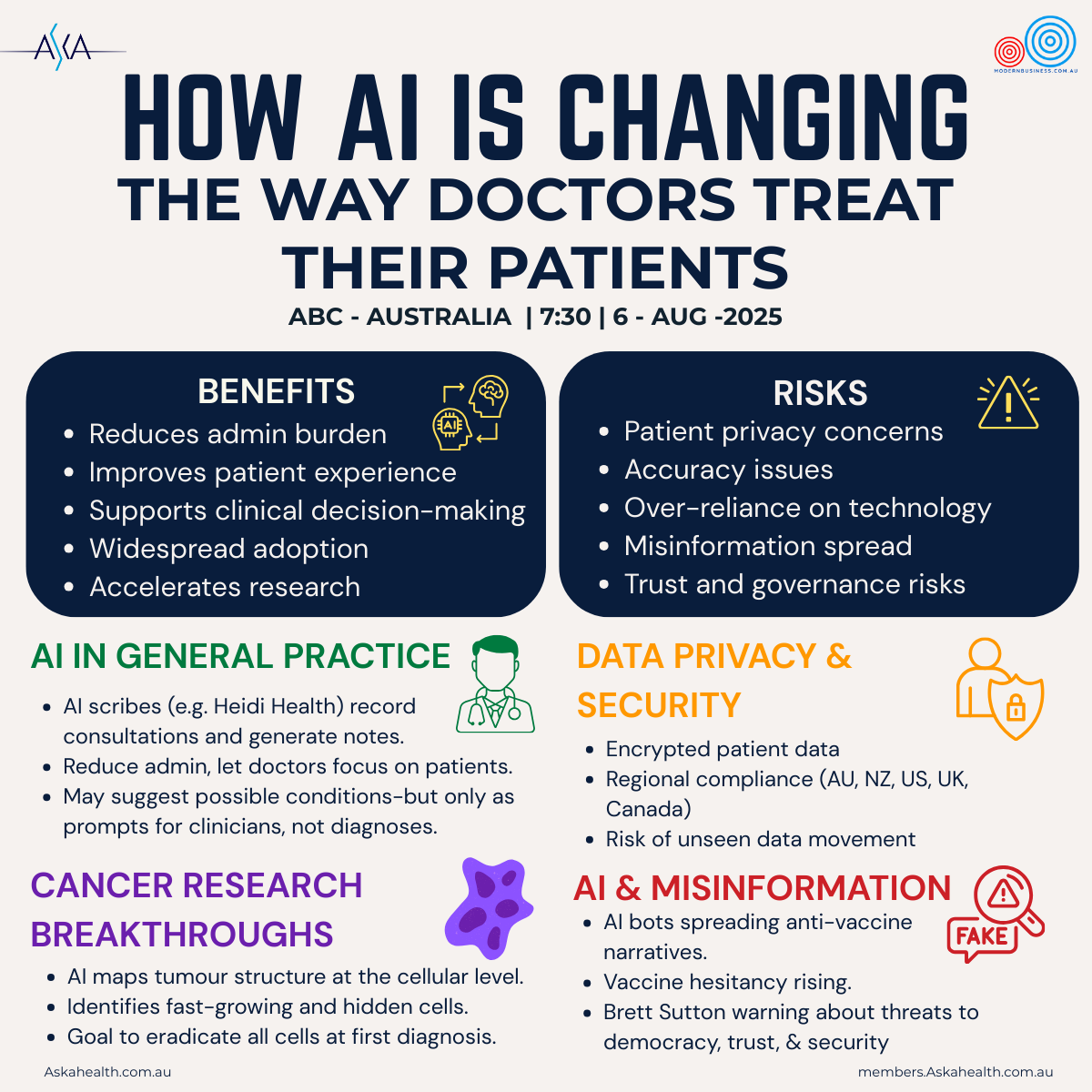

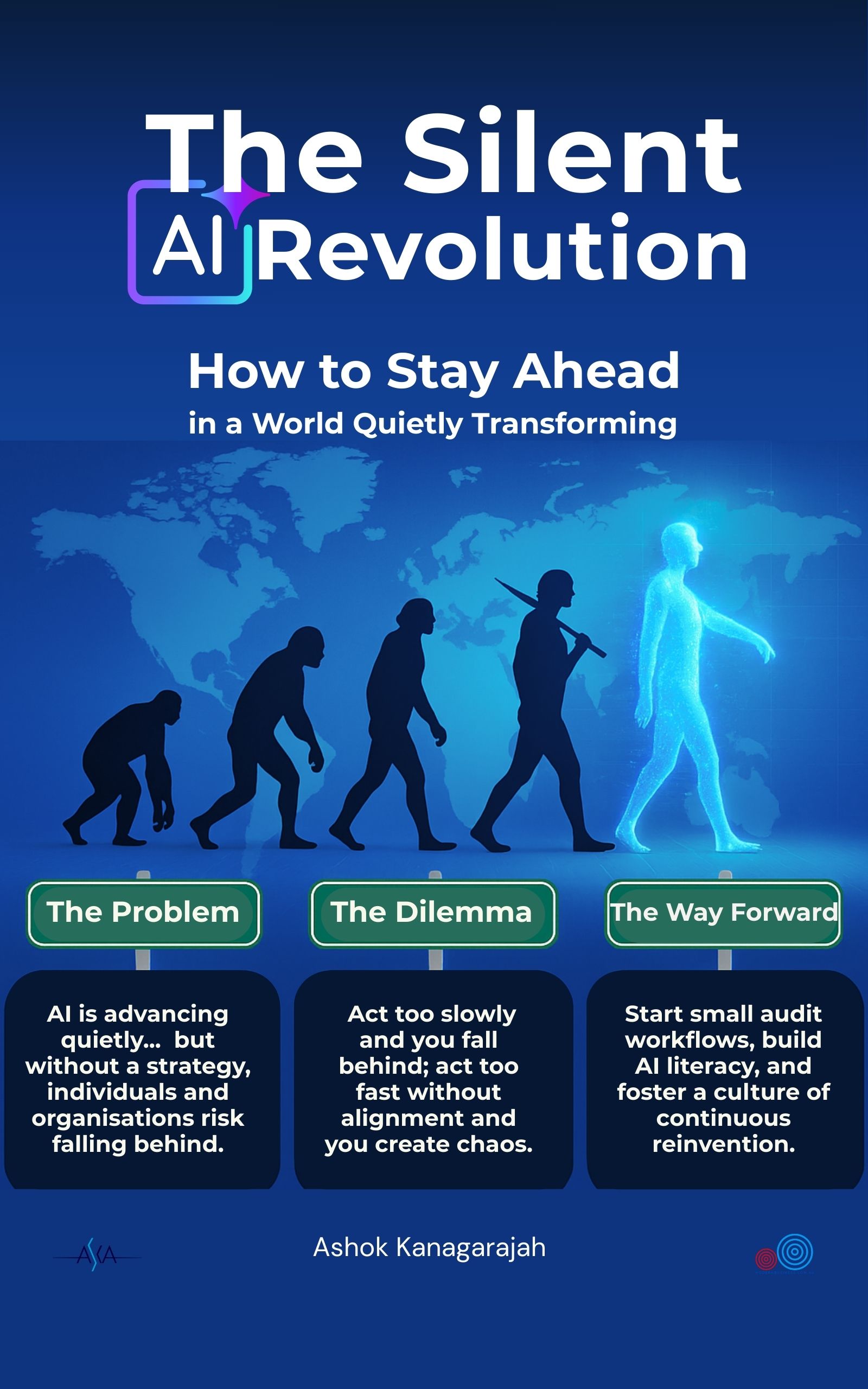
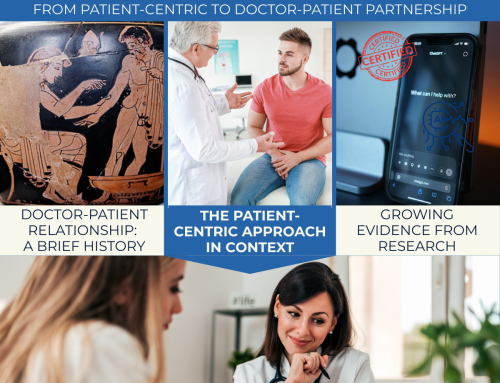
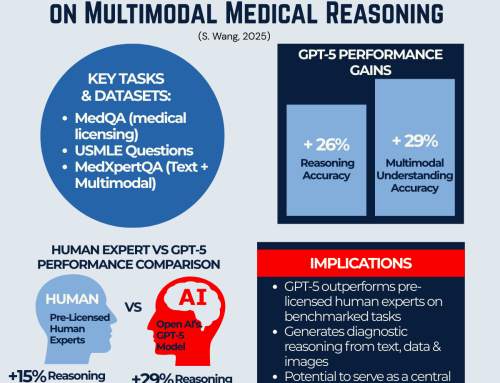
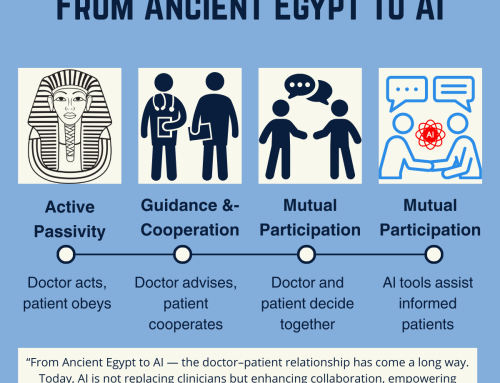

Leave A Comment